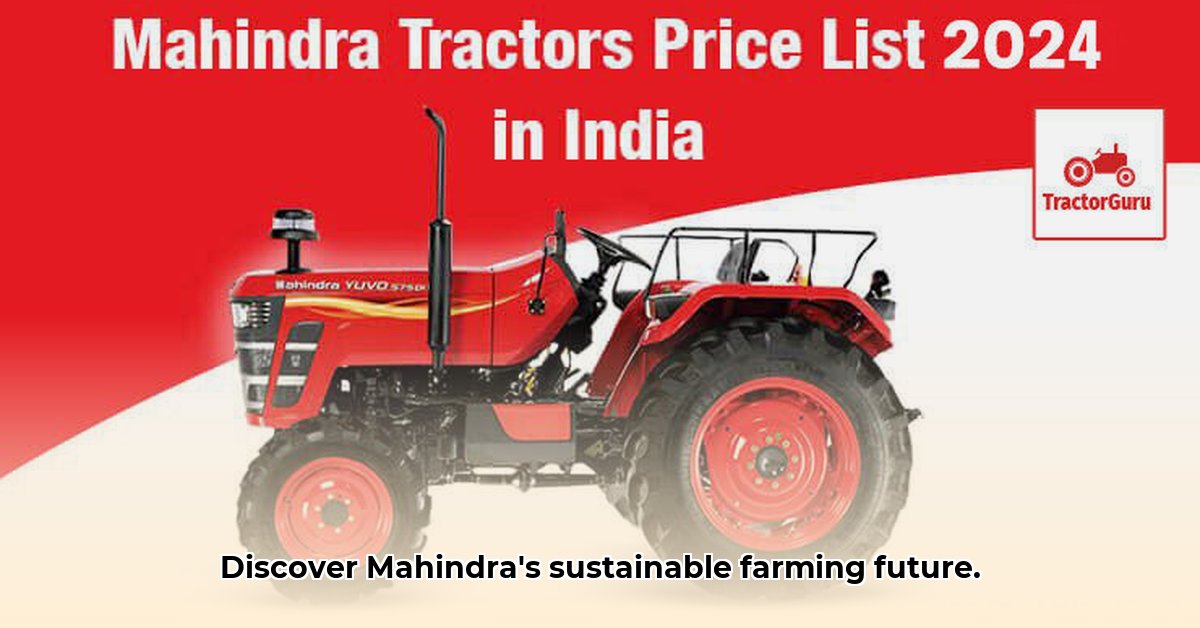
Choosing the right tractor is a pivotal decision for any farmer, significantly impacting productivity, finances, and environmental responsibility. Mahindra offers a diverse range of tractors, making informed selection crucial. This guide explores Mahindra's lineup, sustainability considerations, and actionable steps for a successful, eco-conscious farming operation. For a detailed look at Mahindra's models, see the Mahindra Tractor Models.
Mahindra's Tractor Lineup: Diverse Options for Various Needs
Mahindra provides a wide selection of over 35 tractor models, ranging from approximately $13,000 to $54,000, and horsepower from 19 HP to 71 HP. This variety caters to small family farms and large commercial operations alike. But how do these models align with growing concerns about sustainable agriculture? This is a key question that requires further examination.
The Sustainability Factor: A Need for Transparency
While Mahindra offers a broad selection, assessing their environmental impact requires more readily available data. Detailed information on fuel efficiency and emissions is crucial for farmers committed to sustainable practices. The lack of easily accessible, specific emission data hinders the ability to definitively assess the environmental footprint of each Mahindra model. This lack of transparency presents a challenge for farmers aiming for environmentally conscious operations, and it's an area where Mahindra could significantly improve.
Choosing Your Mahindra Tractor: A Practical Guide
Selecting the right Mahindra tractor requires careful consideration of several key factors:
- Fuel Efficiency: Fuel costs significantly impact profitability. Lower fuel consumption translates to lower operating expenses and reduced emissions. Prioritize models with demonstrated fuel efficiency.
- Emissions: Carefully examine emission ratings to understand the environmental impact. Lower emissions are crucial for sustainable farming.
- Maintenance: Evaluate the tractor's maintenance requirements. Easy and less frequent maintenance minimizes downtime and reduces long-term costs.
- Total Cost of Ownership (TCO): Consider the entire cost – purchase price, fuel, maintenance, repairs, and potential resale value – to make a well-informed decision about long-term cost-effectiveness.
Thorough research is paramount. Compare Mahindra models and competitors, scrutinizing specifications and talking to multiple dealerships to address your individual circumstances.
Mahindra's Role: A Call for Greater Transparency in the Industry
Mahindra, as a significant player in the agricultural machinery market, has a responsibility to provide comprehensive information on the environmental impact of its tractors. Detailed data on fuel consumption, emissions, and lifecycle assessments should be readily available to allow farmers to make informed decisions aligned with their sustainability goals. This transparency would benefit both farmers and the environment. Dr. Anya Sharma, Agricultural Sustainability Expert at the Global Food Institute, states, "Greater transparency in emission data from manufacturers is essential for farmers to make sustainable choices. Data-driven decisions are key to a greener future."
Sustainable Farming: A Collaborative Approach
Achieving sustainable agriculture requires a collective effort:
Mahindra's Actions:
- Enhance Online Resources: Publish detailed, readily accessible information on the environmental impact of every tractor model, including transparent data on fuel efficiency and emissions.
- Invest in R&D: Invest in developing environmentally friendly technologies, such as hybrid or electric powertrains, to minimize environmental impact.
Farmers' Roles:
- Prioritize Fuel Efficiency: Focus on fuel-efficient models and practices to reduce both cost and environmental impact.
- Explore Sustainable Financing: Seek financing options that incentivize sustainable agricultural technology.
Environmental Groups' Role:
- Advocate for Transparency: Continued advocacy for manufacturers to provide comprehensive data on environmental impacts.
- Support Sustainable Initiatives: Support policies and initiatives that promote sustainable farming practices.
Government and Regulatory Actions:
- Implement Stricter Regulations: Establish and enforce robust emission standards to drive the adoption of greener agricultural machinery.
- Incentivize Sustainable Practices: Offer incentives such as tax credits or grants to encourage sustainable farming practices.
Mitigating Farming Risks
Farming involves inherent risks. Here are some potential challenges and mitigation strategies:
| Technology/Factor | Likelihood of Failure | Potential Impact | Mitigation Strategies |
|---|---|---|---|
| Tractor Engine Reliability | Moderate | Reduced productivity, repair costs | Regular preventative maintenance, choosing proven engine designs, and having a backup plan |
| Supply Chain Disruptions | Moderate | Delays, increased costs | Diversify suppliers, build buffer stock of essential parts |
| Regulatory Compliance | Low | Fines, market restrictions | Stay informed about changing regulations and ensure compliance |
| Adoption of Sustainable Technologies | Low | Slower market penetration of new tech | Support initiatives promoting sustainable farming practices |
The future of farming depends on sustainability. Collaboration among farmers, manufacturers, environmental groups, and governments is crucial to build a more environmentally responsible and economically successful agricultural sector. Making informed equipment choices is a key step in this journey.